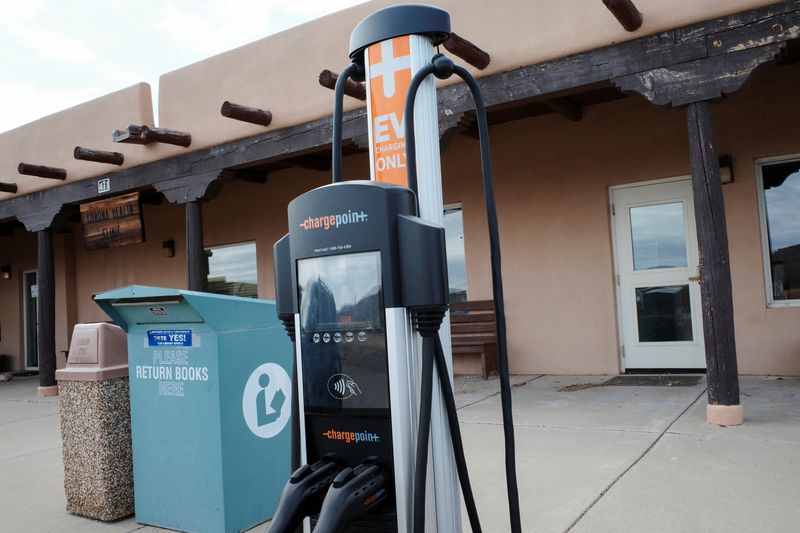By Heekyong Yang and Zoey Zhang
SEOUL/SHANGHAI (Reuters) - Chinese battery materials firms are ramping up investment in South Korea, announcing projects worth at least $4.4 billion this year to try to meet U.S. electric vehicle (EV) tax credit rules aimed at lowering reliance on China's supply chains.
Five battery materials plants worth about 5.6 trillion won ($4.4 billion) in total have been announced this year by Chinese companies and local partners in South Korea, including battery firms POSCO (NYSE:PKX) Future M and SK On, according to a Reuters review of project announcements.
The deals follow the introduction of the U.S.'s Inflation Reduction Act (IRA), which requires at least 40% of the value of critical minerals used in an auto battery to be sourced from the United States or a free trade partner to qualify for a $3,750 tax credit per vehicle.
The IRA, designed to wean the U.S. off the Chinese supply chain for electric vehicles (EVs), will also eventually bar tax credits if any EV battery components were manufactured by a "foreign entity of concern", a provision aimed at China.
South Korea has a free-trade agreement with the United States that would likely make batteries manufactured in the North Asian nation and later installed in U.S.-manufactured electric cars eligible for the federal tax credits.
But Kang Dong-jin, an analyst at Hyundai Motor Securities, cautioned that setting up South Korea-China JV battery firms could become more complex, as the U.S. Treasury Department has not yet provided a concise definition of "foreign entity of concern" and how it would be applied.
That hasn't stopped Chinese companies from setting up a series of joint projects with South Korean partners.
China's Ningbo Ronbay New Energy Technology said last week that Seoul had approved its plan to add 80,000 tonnes in cathode materials production capacity to its South Korea facility that can currently produce 20,000 tonnes a year.
The company said its products produced in South Korea are compliant with IRA requirements on key minerals and can take advantage of the benefits of tariff policies applying to exports to European and U.S. markets.
"Chinese firms often sign deals with South Korean battery makers to diversify their own product portfolios as part of strategies to alleviate geopolitical risks in light of the IRA," a South Korean company official familiar with the matter told Reuters.
The deal follows two separate battery materials joint ventures China's Zhejiang Huayou Cobalt (SS:603799) announced this year, one with POSCO Future M (KS:003670), and another with LG Chem (KS:051915), which owns battery cell maker LG Energy Solution (KS:373220).
SK On and its supplier EcoPro Co (KQ:086520) also announced a joint venture with China's Green Eco Manufacture to make battery precursors in South Korea.
POSCO Holdings said last month it would cooperate with China's CNGR Advanced Material (SZ:300919) on nickel refining and precursor production in South Korea.

South Korea is home to the world's three big battery producers - LG Energy Solution, Samsung SDI (KS:006400) and SK On - which together control nearly a quarter of the global EV battery market and supply all major automakers.
($1 = 1,274.0000 won)